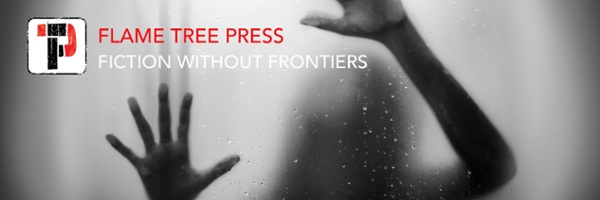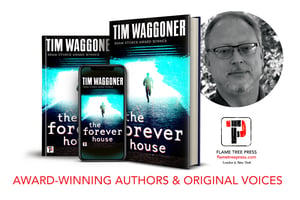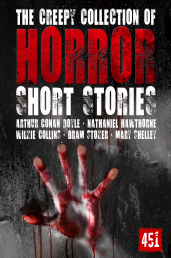In the first of this month's Q&As with our March authors, we have Tim Waggoner. He talks about who he based his characters on, advice to aspiring writers and he gives us a sneak peek into what he is working on at the moment! Be sure to check in tomorrow for more writing inspiration!

What is the book about?
The Forever House is about an inhuman family called the Eldreds who feed on the negative emotions of humans. They move into a neighborhood, lure their neighbors into their house, and confront them with nightmarish scenarios designed to heighten their darkest emotions so that the Eldred can feed. The humans drawn into the Eldreds’ trap are forced to overcome their differences and work together in order to survive – if they can.
What are the underlying themes?
The themes of The Forever House are the bonds – and fractures – within families, how we can never really know what goes on in the minds and hearts of those closest to us, how people in modern American society are disconnected from each other, how people all too easily succumb to prejudice and hate instead of focusing on what unites us, and what would people do when faced with the choice to make their darkest, most forbidden desires come true?
Did you base your characters on anyone you knew?
I always base characters on people I know. In one sense, every character I write about is based on an aspect of me. Sometimes they’re based on people I know or who I’ve observed. Sometimes they’re based on people whose stories I’ve read about. I never put a person I know into a story whole cloth, though. Like Dr. Frankenstein, I create my characters by stitching together bits and pieces of various people to create something new and different. I want the freedom to not only make characters fit my story, I also want to be able to do awful things to them without anyone thinking I’m torturing real people in literary effigy.
Who influenced you most in the writing of the book?
There are a number of authors whose dark fantasy has influenced my own: Ray Bradbury, Charles deLint, Clive Barker, Stephen King, Neil Gaiman, Caitlin R. Kiernan . . . but one of the strongest influences is the work of Jonathan Carroll. The first novel of his I read was The Land of Laughs, and if was a perfect fusion of fantasy and horror – exactly the kind of work I was trying to produce myself. If you could analyze the artistic DNA of The Forever House, you’d find a great deal of Carroll in it.
Is there any advice you can give someone starting to write?
One of the most common pieces of advice new writers hear is “Write what you know.” But if you take it too literally, all you’ll do is write personal essays, not fiction. Better advice would be to write what fascinates you, what scares you, what infuriates you, what mystifies you . . . Write the kind of book you’d love to read, only it doesn’t exist yet. Write the book only you can write, one that grows out of your imagination and obsessions, not anyone else’s – and don’t let rejection get you down. Keep writing!
Where did you write?
Sometimes I write at home, but often I go out to a coffee shop. I like listening to the white noise of the crowd’s conversation, and I find that writing in the midst of life happening around me – people coming and going, chatting, working – is inspiring. There’s often a mix of busyness and calm energy in those places, and I find it both invigorating and soothing at the same time, and this combination seems to help me get into a creative mindspace in a way other environments can’t.
Did you write in silence, or to any particular music?
I can’t write to music that has lyrics. The words of the song interfere with the words I’m trying to produce. If I listen to music when I write, I listen to classical or jazz. Sometimes I’ll listen to music that fits the mood of a scene I’m working on. When I write a particularly dark scene I’ll listen to music from Twin Peaks or to dark ambient music, such as Lustmord’s albums. Sometimes I write in silence. It all depends on what sort of atmosphere gets the words flowing and keeps them flowing.
Did you find it hard to write? Or harder to edit your own work?
I sometimes find it hard to get started on a story or a novel, even when I’m working from a previously created outline. Each story has its own voice, rhythm, and style, and much of that occurs organically as I write. Once I’ve found my way into the world of a particular piece of fiction, the writing goes relatively smoothly after that. I don’t find it difficult to edit my own work, but like most writers, I can’t always be objective about a piece’s strengths and weaknesses, so having another set of eyes look over my stories is invaluable.
What was it like to be edited by someone else?
As I said above, getting an objective opinion about my work is vital for me. I write for other people to read, and only other people can tell me if I’ve succeeded in communicating what I wanted in the way I wanted. Different editors have different approaches. Some are concerned with larger elements like plot and characterization, others are more focused on matters of style and sentence structure. Some view themselves as helping to make the author’s work the best it can be, while others view themselves almost like collaborators, suggesting significant changes to a work. I like being able to bounce ideas off another person, but I’d rather an editor be focused on making a story of mine the best it can possibly be instead of trying to basically rewrite it their way. If I wanted to work with a collaborator, I’d have started out that way. Now, for tie-in fiction, the situation is different. There’s a higher degree of collaboration built into the process since you’re working with someone else’s intellectual property. For those kind of stories, a more collaborative editor is essential.
What are you writing now?
Right now I’m working on a tie-in novel set in the Alien universe called Alien: Prototype. I was in high school with the original novel came out, and if you’d told me then that one day I would be writing a novel about a Xenomorph, I wouldn’t have believed you. It’s a wonderful privilege to get to play in someone else’s sandbox like this, and I’m having a blast!
Thank you!
Thank you to Tim for taking the time to talk today about The Forever House. You can pick up this book, along with the other March releases now. It will be available in paperback, hardback and ebook. Check out our website for details.
 Tim Waggoner’s first novel came out in 2001, and since then he’s published close to fifty novels and seven collections of short stories. He writes original dark fantasy and horror, as well as media tie-ins. His novels include Like Death, considered a modern classic in the genre, and the popular Nekropolis series of urban fantasy novels, as well as The Mouth of the Dark and They Kill, both published by Flame Tree Press.
Tim Waggoner’s first novel came out in 2001, and since then he’s published close to fifty novels and seven collections of short stories. He writes original dark fantasy and horror, as well as media tie-ins. His novels include Like Death, considered a modern classic in the genre, and the popular Nekropolis series of urban fantasy novels, as well as The Mouth of the Dark and They Kill, both published by Flame Tree Press.
In 2017 he received the Bram Stoker Award for Superior Achievement in Long Fiction, and he’s been a multiple finalist for the Shirley Jackson Award and the Scribe Award. His fiction has received numerous Honorable Mentions in volumes of Best Horror of the Year, and in 2016, the Horror Writers Association honored him with the Mentor of the Year Award. In addition to writing, he’s also a full-time tenured professor who teaches creative writing and composition at Sinclair College.
Make sure you check back in with the blog for more Q&As with the authors of our March releases!
- FLAME TREE PRESS | March Releases | 1 | Robert Mitchell Evans Q&A
- FLAME TREE PRESS | March Releases | 2 | Tim Waggoner Q&A
- FLAME TREE PRESS | March Releases | 2 | A Yi Excerpt
- FLAME TREE PRESS | March Releases | 3 | Upcoming Titles




